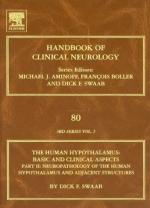|
This section contains 385 words (approx. 2 pages at 300 words per page) |
Deep within the center of the brain, below the thalamus and above the pituitary, lies the essential link between the human body's endocrine and nervous systems, and the overall controller of the autonomic or automatic nervous system. Connected to the brain and spinal cord, the hypothalamus automatically monitors and adjusts the body's nervous system and its metabolism, which in turn impact eating, drinking, hormones and sexual drives, temperature and emotional reactions. Thus, this small part of the brain controls each person's basic drives for hunger, thirst, sex, and emotions.
The hypothalamus is found in the limbic system of the brain, which is connected by nerve fibers with the mental or intellectual part of the brain, the cortex. Because the hypothalamus directs both emotions and physical changes, it is the link between subjective feelings of emotion based in the brain's cortex and the physiological changes throughout the rest of the body. For example, the hypothalamus controls heart rate and blood flow, breathing, and dilation of the pupils in the eyes. Cells in the hypothalamus react to increased temperature caused by exercise or heat by sending signals to the nervous system to begin the body's cooling processes, including sweating and dilation of the blood vessels. Likewise, it signals the nerves to initiate shivering, and the blood to slow its flow when the body is cold. Each of these physical parameters can change drastically according to a person's emotions, an interaction balanced by the hypothalamus.
The balance of hormones in the body, or the endocrine system, is also controlled by the hypothalamus. It regulates this part of the body by sending messages to the main hormone gland, the pituitary, which controls other endocrine glands. Nerve impulses from other parts of the brain influence the hypothalamus to send such messages. These hormones control the body's metabolism, responses to stress, fluid and sugar balance, and reproductivity. Thus sexual development and arousal are also controlled by the hypothalamus, which secretes a gonadotropin-releasing hormone, or GnRH, at the beginning of puberty. This hormone then stimulates other hormonal production and thus development of the body's sexual organs. Recent research by Dr. Theo Colborn and other international researchers has found that many persistent chemicals found throughout the world may be impacting the hypothalamus, thus affecting some people's sexual, emotional and physical development.
|
This section contains 385 words (approx. 2 pages at 300 words per page) |


